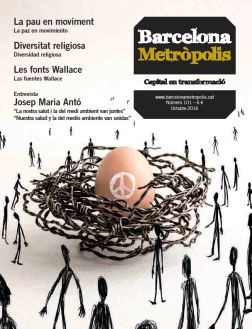The phenomenon of the precariousness of places of worship in Barcelona is real; it is not endemic, but it affects the most impoverished communities. It is a question of social strata, not of specific religions. The demand for spaces for religious use is increasing, and the administration is starting to look for other solutions.
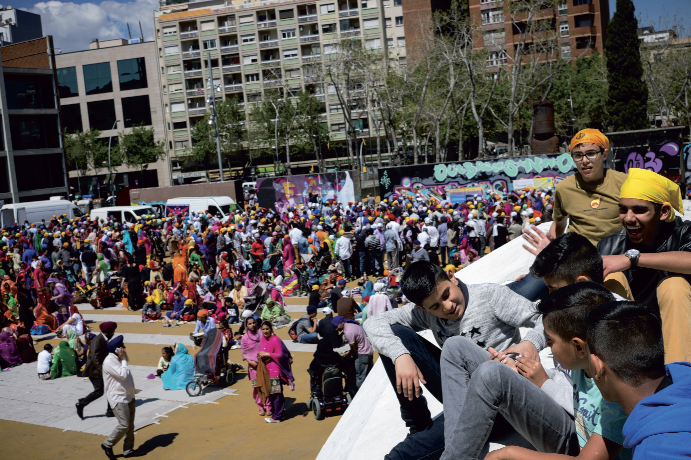
A Vaisakhi procession celebrating the Sikh new year, which is celebrated on 14 April, and ends with a large communal meal in Les Tres Xemeneies park, in Poble-sec.
Photo: Arianna Giménez
The seats in the stalls of the Teatre Principal on Barcelona’s Rambla are full. The audience sings, cries and cheers. A dozen musicians play the final bars of the third song (“I will sing to the one who rescued me / I will sing to the one who received me”). One of the 20 or so technicians working this Sunday morning activates the smoke machines on the stage. Gradually, coming out from the shadows towards the lights, the figure of Juan Mejías can be seen. The sound technician adjusts the volume of the band, lowering it to the level of background music. Now only the organ remains prominent. Juan Mejías, pastor of the Hillsong Barcelona Evangelical Church, grabs the microphone and blesses the congregation.
At the same time on Sunday, John Asemota waits his turn in a chair, with the Bible on his lap, taking notes in a small notebook. He is the pastor of the Power of God’s Grace Ministry, waiting to give his sermon at the Sunday service of this Evangelical community, which is formed mainly of people of Nigerian origin. They also sing – in English, as is the entire service – and the pastor demonstrates passionate devotion in his sermon and the congregation pray out loud with their eyes shut. (“I have confidence in you, Saviour / I have confidence in you, Jesus”). The church is in an old warehouse, forgotten on a precariously tarmacked side street on an industrial estate in the Bon Pastor neighbourhood. It is not easy to find the first time, which is why the workers on the estate give precise such directions: “They are there on the left, the blue metal door, right by the scrap yard.”
The city council is trying to improve their situation through funding lines that have been available since 2014 to refurbish places of worship, but sometimes the problem is more deeply rooted. Gloria García-Romeral is a municipal technician at the Oficina d’Afers Religiosos (OAR, Office of Religious Affairs) and works with Muslim communities: “In the African communities, the majority of members are undocumented and collect scrap or are street vendors, for example.”
There are communities that, according to OAR director Cristina Monteys, raise the shutters, paint the premises and begin their activity without registering in the Ministry of Justice’s Registry of Religious Entities. The requisite paperwork is not accessible to persons who do not have their documents in order: “If the District initiates proceedings, the community could end up without any premises, since they are carrying out an activity without a licence.” If this occurs, the OAR can only act as mediator: “We don’t have the jurisdiction to grant licences or permits or to carry out inspections”, says Monteys.

The sermon from pastor John Asemota is the most impassioned of those heard at the Sunday service for the Power of God’s Grace Ministry evangelical community, who are mostly from Nigeria.
Photo: Arianna Giménez
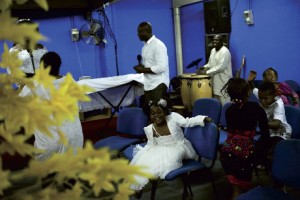
Children from the Power of God’s Grace Ministry evangelical community play following the Sunday service.
Photo: Arianna Giménez
Before arriving at Bon Pastor, the Power of God’s Grace Ministry Church passed through various premises in Santa Coloma de Gramenet that they had to leave owing to noise complaints from the neighbours. Now, surrounded by industrial premises, they are not bothering anyone, particularly as Sunday service takes place on a day when the estate is deserted.
At the Teatre Principal, Hillsong pastor Juan Mejías is giving his sermon. He speaks plainly, dotting his talk with present-day allegories. The average age of attendees is under 40 years old. “Just because we have a modern church doesn’t mean that it’s a superficial church”, he says during the service. The Hillsong Barcelona Church originated from meetings between Mejías and his partner Damsy Mich, another pastor in the community, and other friends in a Starbucks. They spent the time reading the Bible and debating. After studying theology at the Hillsong International Leadership College in Australia, they founded the Barcelona chapter. Currently, around 1,000 faithful attend the three Sunday services.
Protestant communities
There are 167 Evangelical Christian, i.e. Protestant, centres in Barcelona. Although they have been in the city for almost two centuries, the arrival in the 1990s of Latin American and Sub-Saharan Evangelicals has led to the creation of independent churches, often formed according to nationality.
Many communities (not just Evangelicals) carry out work related to drug addiction and prevention or reception of refugees, says Lola López, the city council’s immigration commissioner: “But they don’t have the power of Caritas, because they are very small.” In the case of the Power of God’s Grace Ministry, there are regular campaigns to collect money for the poorest in the community. In addition to helping with bureaucratic matters, the community tries to cover the costs of transport and food for those in need. Grace, the pastor’s wife, explains that they have managed to get many of their compatriots out of prostitution and prevent more than one suicide. In addition, owing to the economic crisis in Spain, many of the congregation have returned to Nigeria or tried their luck in other European countries.

The pastor Juan Mejías and his partner Damsy Mich founded Hillsong Church Barcelona four years ago. The picture shows Mejías leading a Sunday service for followers of their religion.
Photo: Arianna Giménez
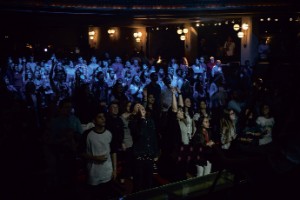
One of the three Sunday services held by the Evangelical Hillsong Church at their centre in the Teatre Principal. In total around a thousand people attend.
Photo: Arianna Giménez
Both the Hillsong and Power of God’s Grace Ministry communities are self-funded and the two dedicate a significant part of Sunday worship to talking about the importance of donations. At the industrial premises in Bon Pastor, they sing a song and pray before putting envelopes in a box. The attendees at the Teatre Principal can make their “tithes and offerings” though a link on the Hillsong website, by bank transfer (which can be set up as a direct debit) and even at the theatre itself with their credit card.
The phenomenon of the precariousness of places of worship in Barcelona is real; it is not endemic, but it affects the most impoverished communities. It is a question of social strata, not of specific religions.
The Grace Ministry faithful leave the service still singing “People will see, testimony of my life”, and a couple of children who were at the church are now playing with the only two white people there, the journalists. The Hillsong faithful leave the Teatre Principal and step out onto the Rambla with the final verses of Soberano (“God of the universe, eternal Saviour”) still playing in their heads, surrounded by tourists among whom they walk unnoticed.
Demand for public space
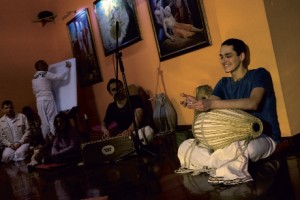
The Hare Krishna temple in Plaça Reial. The meditations are accompanied by music from a harmonium and a mridangam.
Photo: Arianna Giménez
Also on Barcelona’s La Rambla, albeit some hours later at around 5 pm, the Hare Krishna retinue begins its march at Drassanes. They parade behind a standard bearing the mantra that gives them their name, which they continuously repeat throughout the procession. They reach Canaletes, turn around and set off in the opposite direction, down the Rambla. Some people move to one side when they see them, others join the march and dance and a few others make fun of them. As there are only a few Hare Krishnas, it is not difficult for them to have enough public space to exercise their right to demonstrate and disseminate their religion.
Monteys says that at OAR, they prefer to describe secularism as a neutral space that is open to all (including those who are non-religious). The Chair of Ateus de Catalunya, Albert Riba, is not opposed to the fact that religion occupies the public space “provided that it doesn’t monopolise it”, and argues that this space should be “an agora not only for freedom of religion but also freedom of conscience”.
The demand for spaces for religious use is increasing, and the administration is starting to look for other solutions. For now, the immigration commissioner Lola López stresses that the council “has found spaces for people to celebrate, for example, Corpus Christi or the Sikh Vaisakhi parade”. The spokesman for the Sikh community, Gagandeep Singh Khalsa, plays an influential role in mediating between the interests of the community and the administration, and it is thanks to his work that this community has not experienced too many problems when it comes to organising public events: “What gives me the greatest satisfaction is seeing Catalans among us, no matter what religion they are”, says Gagandeep, smiling through his thick beard.
There are around 2,000 people in Barcelona’s Tres Xemeneies park. Large cloths have been laid on the ground and people are eating typical products from their home region of northern India. They are celebrating the parade of Vaisakhi, the Sikh baptism.
The day began hours earlier with a martial arts demonstration on the Rambla del Raval. Countless weapons were lying on a canvas on the floor: swords, knives, shields, lances, clubs and the chakkar (a wheel with filaments in the shape of spokes with weights at the end of each one). Five young Sikhs are on the other side of the weapons. To the sound of two drums, the faithful demonstrated their expertise in handling various weapons with well-thought-out choreography. Occasionally, a manoeuvre would be unsuccessful, but nothing major.
The Sikhs have just one premises in Barcelona, the Gurudwara. It offers food to anyone wishing to enter, the only condition being that they must take off their shoes, cover their head and prostrate themselves before the holy book, the Guru Granth Sahib, which they consider to be an infallible guide. They therefore treat it as if it were a person: bringing it offerings, covering it, putting it to bed at night and waking it up in the morning.
Somewhat more difficult to organise are the annual Jehovah’s Witness assemblies in Barcelona. This June, they hired Espanyol’s football ground, for the third time, for a meeting that was attended by 23,500 people. “It was a nice programme; the central theme was loyalty and faithfulness to God and fellow man”, explains Josep Morell, a member of the Jehovah’s Witnesses in Catalonia. 104 people were also baptised by immersion. Morell does not know how much it costs to hire the site.
Cristina Monteys, OAR director, says that sometimes communities ask the Districts for municipal spaces, but they receive cursory refusals: “Not due to the rejection, but because sometimes, within the city council itself, there is a notion of secularism that is…” she measures the description, “let’s say, restrictive.” To correct this situation, on last october, the City Council regulated the assignment of public spaces and municipal facilities for holding religious activities.
The city council is working on a proposal to redefine the competences in this area, which, as this article was being finalised, had still not been presented.
Ramadan
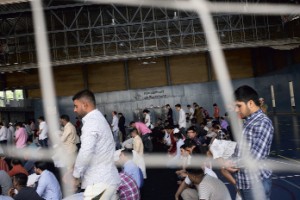
Members of Muslim community Minhaj-ul-Quran in the Raval neighbourhood during Friday prayers in the Sant Oleguer sports centre, which they rent for this purpose.
Photo: Arianna Giménez
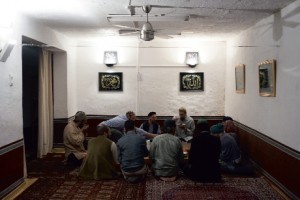
Wadud, who started the Sufi school of the Naqshbandi order, breaks the Ramadan fast with companions.
Photo: Arianna Giménez
Some progress has been achieved for other large festivals, as in the case of Ramadan. The council has reached an agreement with the Barcelona Sports Institute (IBE, Institut Barcelona Esports) to use the sports facilities. But here, again, the problem is money: “There are communities that ask us for a space for the 30 nights during which Ramadan takes place and, of course, the solution cannot be to offer them the facilities free of charge because if there is a public price and people pay it, then they have to as well”, says Monteys.
One of the communities that can afford rent is Minhaj-ul-Quran. Every Friday (the holy day in Islam) during Ramadan, they hold the Friday midday prayer in a room at the Sant Oleguer Municipal Sports Centre in El Raval. Mohammed Iqbal, Vice-Chair of the community, says that although they have always had a good relationship with the District councillors, negotiations are not easy: “Politicians always look at votes, and public opinion does not usually look kindly on these things.”
Ramadan began on 6 June, coinciding, as always, with the last moon of the eighth month of the Islamic calendar. That night, at the Minhaj-us-Quran oratory (one of the 25 Muslim oratories in the city), 300 people broke their fast after 15 hours without eating or drinking. In barely 15 minutes, all the men (there were no woman) had eaten and a crowd of people had gathered up the tablecloths: “The premises aren’t very big, so we eat quickly and use the same space for eating and praying”, explains Iqbal, one of the many carrying plates and cloths.
With prayers already started, more followers arrived, filling the room. Many had come from work. One of them arrived worn out, prayed for barely three minutes and left. A short time later he was seen back in his spot, behind the counter, in one of those shops that sells everything.
Around that same time, on the Turó del Carmel hillside, a girl was also arriving late to the iftar (Ramadan dinner). Other members of the Sufi community of the Naqshbandi oratory had broken their fast frugally – a couple of dates, an apricot here, some chocolate there – and were already saying the first prayer. The girl took some sips of water and joined the prayer. It was her first Ramadan. Once the prayer was finished, and while the 20-odd members of the small community were preparing the main meal – larger this time, with lentil soup, salad and cheese – the Chair, Abd al-Fatah, spoke with the first-timer: “Always have some dates on you, so when the sun sets you’ll be able to break the fast, wherever you are. I always do it.”
Muslims started to become visible in Barcelona in the 1980s. Since then, the arrival of Pakistanis and Sub-Saharan Africans, in particular, has enriched Islamic culture in the city. More residually, some Catalans have embraced Islam as a religion. This is the case of the Naqshbandi community, mostly made up of converts. Wadud, originally from a small town in Montseny, north-east of Barcelona, formed the community 20 years ago. He says that, after flirting with Freemasonry and dipping his toe into Buddhism and Hinduism, he found “the path of realisation” in Sufism, known as the mystical branch of Islam due to the importance of contemplation, music, poetry and spiritual perfection.
During the informal meal, the Sufis appear relaxed and joke around. Men and women occupy the same space, although they do not mix. They will finish eating around midnight, they will pray, sing and spend the small hours together as a community. At around 4:20 am they will begin fasting again.
At the exit to the oratory, in the darkness of the slopes of El Carmel, an almost mystical peace absorbs the dense hubbub of the big city. “This is Barcelona, but it’s outside of Barcelona”, says Wadud, and it does not bother him. It reminds him of home, the peacefulness of Montseny.
The Jewish Passover
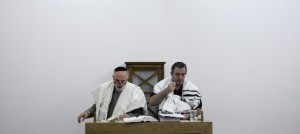
Celebration of the Sabbath in the Bet Shalom community’s synagogue. Any of its members can lead the proceedings.
Photo: Arianna Giménez
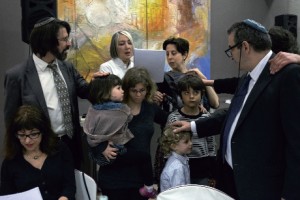
The rabbi, Stephen Berkowitz, and the president of the Bet Shalom community, Jai Anguita, at Passover celebrations.
Photo: Arianna Giménez
In the heart of the city, on a corner in the Dreta de l’Eixample, a Mossos d’Esquadra police patrol stands guard in front of Hotel Catalonia. Later, they will end up playing with the children from table 5, who are having a great time with the officers’ torches. Inside the room, the mother of the children from table 5 had reached the conclusion that it was more practical to leave the children to their own devices than try to keep them calm and silent. They are not old enough to follow the Haggadah, the text that sets out the order of the Passover Seder, the remembrance of the Exodus from Ancient Egypt.
The progressive community Bet Shalom brought together 200 people at Hotel Catalonia to celebrate the Passover Seder. During the ceremony, they paid tribute to the refugees and talked about equal rights for homosexuals and gender equality through the figure of Jewish intellectual and feminist Susannah Heschel.
The Shabbat (Saturday, the Jewish sabbath) celebrations take place at the Bet Shalom community premises. There, the children also run around and play unimpeded during the ceremony, this time held at the community synagogue. The service is conducted in Hebrew, Catalan and Spanish. While not overly solemn worship, it is very devout. In his sermon, Jai Anguita, Chair of the community, mentions Adam Smith and Karl Marx and finishes by recalling that “the Earth is God’s”.
For more than six decades, the only Jewish community in Barcelona was the Comunidad Israelita de Barcelona (CIS, Israelite Community of Barcelona). The arrival of immigrants and ideological differences gave rise to various divisions that have ended up creating a map of four communities, of which Bet Shalom is “the most Catalan and the most progressive”, says its Chair. Asked about so much division, he replies: “What the community leaders may say is not what their members think; nothing is unanimous. Two Jews, three opinions, you know?”



